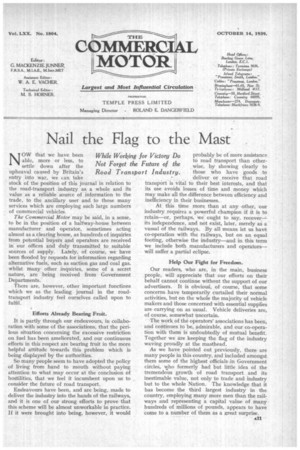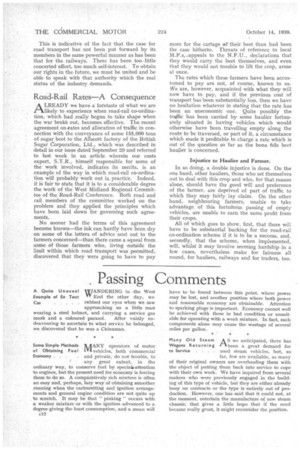Nail the Flag to the Mast
Page 13

Page 14

If you've noticed an error in this article please click here to report it so we can fix it.
NOW that we have been able, more or less, to settle down after the upheaval caused by Britain's entry into war, we can take stock of the position of this journal in relation to the road-transport industry as a whole and its value as a reliable source of information to the trade, to the ancillary user and to those many services which are employing such large numbers of commercial vehicles.
The Commercial Motor may be said, in a sense, to be in the position of a halfway-house between manufacturer and operator, sometimes acting almost as a clearing house, as hundreds of inquiries from potential buyers and operators are received in our offices and duly transmitted to suitable sources of supply. Lately, of course, we have been flooded by requests for information regarding alternative fuels, such as suction gas and coal gas. whilst many other inquiries, some of a secret nature, are being received from Government Departments.
There are, however, other important functions which we as the leading journal in the roadtransport industry feel ourselves called upon to fulfil.
Efforts Already Bearing Fruit.
It is partly through our endeavours, in collaboration with some of the associations, that the perilous situation concerning the excessive restriction on fuel has been ameliorated, and our continuous efforts in this respect are bearing fruit in the more helpful attitude towards this problem which is being displayed by the authorities.
So many people seem to have adopted the policy of living from hand to mouth without paying attention to what may occur at the conclusion of hostilities, that we feel it incumbent upon us to consider the future of road transport.
Endeavours have been, and are being, made to deliver the industry into the hands of the railways, and it is one of our strong efforts to prove that this scheme will be almost unworkable in practice. If it were brought into being, however, it would probably be of more assistance to road transport than otherwise, by showing clearly to those who have goods to deliver or receive that road transport is vital to their best interests, and that its use avoids losses of time and money which may make all the difference between efficiency and inefficiency in their businesses.
At this time more than at any other, our industry requires a powerful champion if it is to retain—or, perhaps, we ought to say, recover— its independence, and not exist, later, merely as a vassal of the railways. By all means let us have co-operation with the railways, but on an equal footing, otherwise the industry—and in this term we include both manufacturers and operators— will suffer a partial eclipse.
• ,
Help Our Fight for Freedom.
Our readers, who are, in the main, business people, will appreciate that our efforts on their behalf cannot continue without the support of our advertisers. It is obvious, of course, that some concerns have temporarily curtailed their normal activities, but on the whole the majority of vehicle makers and those concerned with essential supplies are carrying on as usual. Vehicle deliveries are, of course, somewhat uncertain.
The work of the operators' associations has been, and continues to be, admirable, and our co-operation with them is undoubtedly of mutual benefit. Together we are keeping the flag of the industry waving proudly at the masthead.
As we have pointed out previously, there are many people in this country, and included amongst them some of the highest officials in Government circles, vilio formerly had but little idea of the tremendous growth of road transport and its inestimable value, not only to trade and industry but to the whole Nation. The knowledge that it has become the third largest industry in the country, employing many more men than the railways and representing a capital value of many hundreds of millions of pounds, appears to have come to a number of them as a great surprise. This is indicative of the fact that the case for road transport has not been put forward by its members in the same powerful manner as has been that for the railways. There has been too-little concerted effort, too much self-interest. To obtain our rights in the future, we must be united and be able to speak with that authority which the real status of the industry demands.
Road-Rail Rates—A Consequence
ALREADY we have a foretaste of what we are likely to experience when road-rail co-ordination, which had really begun to take shape when the war brokb out, becomes effective. The recent agreement onirates and allocation of traffic in connection with the conveyance of some 155,000 tons of sugar beet to the Allscott factory of the British Sugar Corporation, Ltd., which was described in detail in our issue dated September 29 and referred to last week in an article wherein our costs expert, S.T.R., himself responsible for some of the work involved, indicates its merits, is an example of the way in which road-rail co-ordination will probably work out in practiCe. Indeed, it is fair to state that it is to a considerable degree the work of the West Midland Regional Committee of the Road-Rail Conference. Both road and rail members of the committee worked on the problem and they applied the principles which have been laid down for governing such agreements.
No sooner had the terms of this agreement become known—the ink can hardly have been dry on some of the letters of advice sent out to the farmers concerned—than there came a squeal from some of those farmers who, living outside the limit within which road transport was permitted, discovered that they were going to have to pay more for the cartage or their beet than had been the case hitherto. Threats of reference to local M.P.s, -appeals to the N.F.U., declarations that they would carry the beet themselves, and even that they would not trouble to lift the crop, arose at once.
The rates which these farmers have been accustomed to pay are not, of course, known to us. We are, however, acquainted with what they will now have to pay, and if the previous cost of transport has been substantially less, then we have no hesitation whatever in stating that the rate has been an uneconomic one. Quite possibly the trakffic has been carried by some haulier fortunately situated in having vehicles which would otherwise have been travelling empty along the route to be traversed, or part of it, a circumstance which made it profitable to charge a rate which is out of the question so far as the bona fide beet haulier is concerned.
Injustice to Haulier and Farmer.
In so doing, a double injustice is done. On the one hand, other hauliers, those who set themselves out to deal with this crop and who, for that reason alone, should have the good will and preference of the farmer, are deprived of part of traffic to which they may fairly lay claim. On the other hand, neighbouring farmers, unable to take advantage of this fortuitous passing of empty vehicles, are unable to earn the same profit from their crops.
All of which goes to show, first, that there will have to be substantial backing for the road-rail co-ordination scheme if it is to be a success, and, secondly, that the scheme, when implemented, will, whilst it may involve seeming hardship in a few cases, nevertheless make for fairness all round, for hauliers, railways and for traders, too.




















































